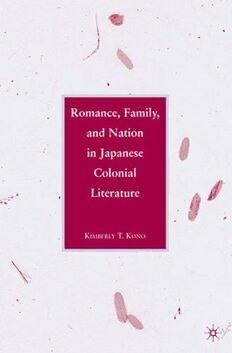
Romance, Family, and Nation in Japanese Colonial Literature PDF
225 Pages·2010·2.553 MB·English
Most books are stored in the elastic cloud where traffic is expensive. For this reason, we have a limit on daily download.
Preview Romance, Family, and Nation in Japanese Colonial Literature
Description:
Romance, Family, and Nation in Japanese Colonial Literature explores how Japanese writers in Korea, Manchuria, and Taiwan used narratives of romantic and familial love in order to traverse the dangerous currents of empire. Focusing on the period between 1937 and 1945, this study discusses how literary renderings of interethnic relations reflect the numerous ways that Japan’s imperial expansion was imagined: as an unrequited romance, a reunion of long-separated families, an oppressive endeavor, and a utopian collaboration. The manifestations of romance, marriage, and family in colonial literature foreground how writers positioned themselves vis-?-vis empire and reveal the different conditions, consequences, and constraints that they faced in rendering Japanese colonialism.
See more
The list of books you might like
Most books are stored in the elastic cloud where traffic is expensive. For this reason, we have a limit on daily download.
